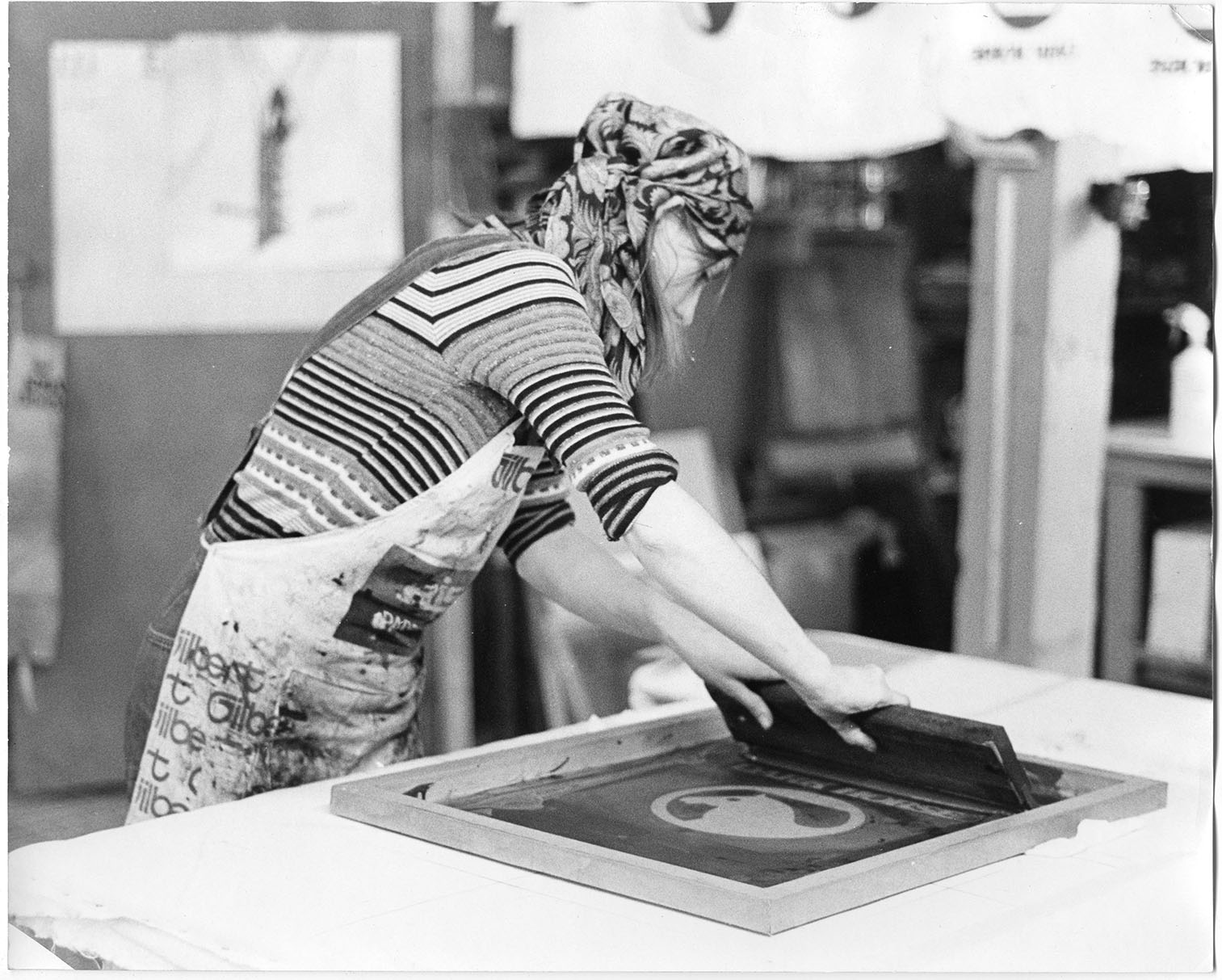Background on New Victoria Publishers

Patty Matasy screen printing, ca.1975
When printers Beth Dingman, Nina Swaim, Katie Cahill, and Shelby Grantham were fired from the Elm Tree Press, a Vermont print shop, after requesting raises to their salaries of three dollars per hour to match male counterparts at other press shops, they considered filing the first ever sex discrimination case in the state. After eventually settling their reparation and discrimination claims out of court, the group was instead energized to continue as professionals, but under better, more progressive and more autonomous working conditions. Together with writer and artist Claudia McKay (Lamperti), they founded New Victoria Printers in 1975, one of two all-female print shops in New England at the time. With two second hand presses – A Chief 15 and a Royal Zenith 14”x20” (they would later acquire a Heidelberg 18”x23.5”) – the group (which would change membership multiple times) rented and fully renovated a carriage shop in Lebanon, NH and began to solicit work from non-profit and politically-oriented groups, believing strongly that “the power of the press belongs to those who own it.”
Like its namesake Victoria Press, an 1860s women run print shop in London owned by Emily Faithful, an early advocate of women's rights, New Victoria was committed to feminist principles and women's liberation. The shop offered work and training in the traditionally male-dominated fields of printing, layout, and graphic design; introduced numerous women to large machine work and repair; initially focused on printing materials from the women's and other progressive movements; and was organized as a collectively owned and democratically run organization. In addition to the work of printing and screening, the shop functioned as a de facto women's center and lesbian hub for Lebanon and the surrounding area, a place of education, community, creativity, and activism, and soon publishing opportunities, as the group founded New Victoria Publishers in 1976 to publish works from their community. Finances were often tight, but the publishing company, as well as adding printing work from beyond the women's movement, often from local businesses and academic institutions, kept the printing press running successfully for ten years until its closing in 1985.
Dingman and McKay then took over the publishing company, running it out of their home in Norwich, VT, where they continued its emphasis on lesbian fiction and other women-centered works. Originally envisioned as a company focused on non-fiction and the re-issuing of feminist classics, it became clear early on that fiction sales would be necessary to keep New Victoria Publishers viable. An early bestseller, Stoner McTavish by Sarah Dreher, put them on the map, and marked the beginning of their focus on, and strength in, the lesbian mystery genre. The publishers prided themselves on books and stories of quality, and in addition to their publications in the mystery, fantasy, sci-fi, humor, and sports genres, they produced other fiction and short story titles, as well as non-fiction and poetry. Dingman, McKay, and long-time printing partner and then editor ReBecca Béguin, were not afraid of controversial or risky subjects either, publishing books on gay and lesbian parenting and children's books, lesbian narrative erotica, menopause, queer lives in Japan, sadomasochistic culture, sex-workers, strippers, transgender stories, and women in prison, as well as a parody of Barbie dolls and accessories.
Both theoretically and practically, New Victoria was actively involved in the growing Women in Print Movement (and associated movement promoting lesbian stories and rights), attending the national and international conferences, and supporting with their editorial and employment choices the desire to document and transform women's and lesbian's lives through books and the book industries. Often straddling the line between viable non-profit and passion project for Dingman, McKay, and the others working with them over the years, New Victoria was undoubtedly a success story in their community and became one of the longest lasting publishers to grow out of the movement. Before the business was sold to new ownership in 2007, the company published over a hundred books by and about lesbians, winning three Lambda Literary Awards and several other honors. It also surely affected the lives of many, both those who worked or trained with New Victoria Printers and Publishers over the years, and also those who read their publications, often encountering for the first time in print in New Victoria books characters and cultures from otherwise marginalized communities. Seeing themselves reflected in print was enormously powerful for many lesbians, and, as one reader put it in a 1992 fan letter to author Sarah Dreher, these stories also had the ability to change the minds of, and bring new understanding to, those from outside groups:
"But there was another thing to impress me, to make me change my mind about a subject: lesbians! I couldn't imagine how lesbians feel, prejudices made me stay away from 'the whole', the strange made me careful and 'better turn away'. Now, that I finished that crime-book, I couldn't only understand (from my stomach, not the brain) Stoner McTavish, but a bit of “fell in love” with her. No, I'm not saying that from this particular moment on I turned out to be a lesbian, it's just that it doesn't feel strange anymore… Your book, as you can see, made me think, change my mind, understand."

